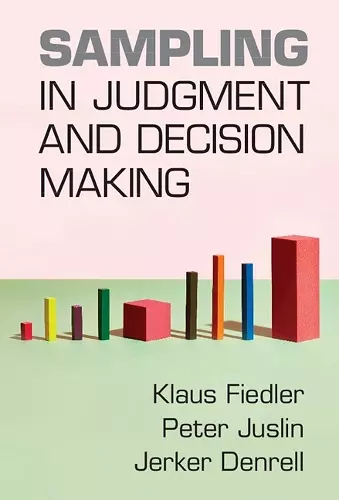Sampling in Judgment and Decision Making
Understanding Cognitive Processes through Sampling Approaches
Klaus Fiedler editor Peter Juslin editor Jerker Denrell editor
Format:Paperback
Publisher:Cambridge University Press
Published:15th Jun '23
Currently unavailable, and unfortunately no date known when it will be back

This book explores innovative sampling methods in decision-making, emphasizing their implications for understanding human cognition and behavior. Sampling in Judgment and Decision Making is a crucial resource.
In Sampling in Judgment and Decision Making, the author presents a comprehensive overview of recent advancements in sampling methodologies as they relate to decision-making processes. This exploration is enriched by insights from leading researchers in the field, making it a valuable resource for students and professionals across various disciplines, including psychology, philosophy, behavioral economics, finance, and organizational behavior. The book emphasizes the importance of understanding how environmental information influences cognitive processes, thereby offering a shift from traditional psychological perspectives.
The text argues that conventional accounts often highlight the limitations of human cognition, attributing bounded rationality to these constraints. In contrast, the sampling approach provides a broader cognitive-ecological viewpoint. It posits that to grasp the intricacies of cognitive functions, one must first examine the distributions and biases inherent in the information available to individuals. By doing so, the book reveals how both the rational and irrational aspects of human decision-making are shaped by the information environment, which includes literature, the Internet, and collective memory.
Ultimately, Sampling in Judgment and Decision Making serves as a prime example of theory-driven research. It not only addresses the challenges of replicability in behavioral science but also enhances the practical applicability of findings. Through the lens of statistical sampling principles, the book uncovers theoretical constraints and offers fresh insights into the complexities of judgments and decisions, making it a critical read for those interested in the intersection of cognition and decision theory.
'Inferences depend heavily on what information is sampled. With chapters by leading sampling researchers, this book provides a fascinating overview of the innovative work done on this topic over recent decades. Sample these chapters to gain insights into how our minds work.' Robin Hogarth, Barcelona School of Economics and Universitat Pompeu Fabra, Spain
'There has been a revolution in cognitive and social psychology. The conventional view on rationality, which locates the causes of poor choices and judgments in the human mind, is being replaced with the view that the properties of informational samples go a long way to explain the successes and the failures of rational and irrational thinkers alike. A massive fundamental attribution error, committed by psychological science, is thus being corrected. This masterly volume, edited by Fiedler, Juslin, and Denrell, is a progress report and a manifesto of hard-nosed scientific progress.' Joachim I. Krueger, Brown University, USA
'This book makes a compelling case that we can greatly enrich our understanding of human judgment and decision making if we focus on how we sample information from environments that often seem deliberately designed to confuse or mislead us.' Barbara Mellers, University of Pennsylvania, USA
ISBN: 9781009009867
Dimensions: 228mm x 151mm x 29mm
Weight: 810g
572 pages